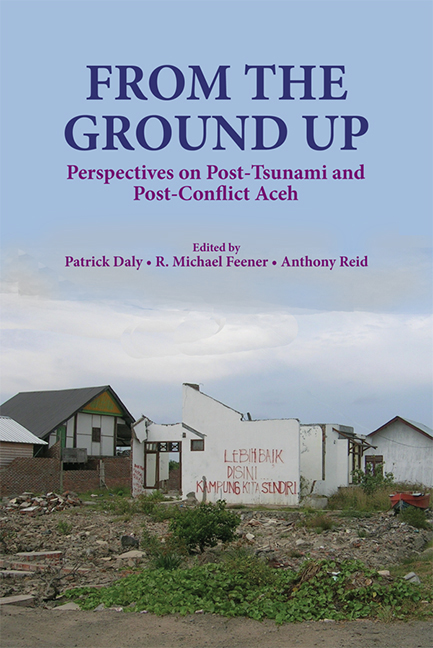Book contents
- Frontmatter
- Contents
- Preface
- List of Figures and Tables
- The Contributors
- Glossary and Abbreviations
- Introduction: Unpacking the Challenges of Post-2004 Aceh
- 1 The Sunda Megathrust: Past, Present and Future
- Part I Reconstruction Efforts
- 2 Disaster Recovery: An International Humanitarian Challenge?
- 3 Linking Relief, Rehabilitation and Development (LRRD) to Social Protection: Lessons from the Early Tsunami Response in Aceh
- 4 Cultural Heritage and Community Recovery in Post-Tsunami Aceh
- 5 Managing Post-Disaster Reconstruction Finance: International Experience in Public Finance Management
- 6 Between Custom and Law: Protecting the Property Rights of Women after the Tsunami in Aceh
- 7 Factors Determining the Movements of Internally Displaced Persons (IDPs) in Aceh
- 8 Aceh's Forests as an Asset for Reconstruction?
- Part II Conflict Resolution
- Index
6 - Between Custom and Law: Protecting the Property Rights of Women after the Tsunami in Aceh
from Part I - Reconstruction Efforts
Published online by Cambridge University Press: 21 October 2015
- Frontmatter
- Contents
- Preface
- List of Figures and Tables
- The Contributors
- Glossary and Abbreviations
- Introduction: Unpacking the Challenges of Post-2004 Aceh
- 1 The Sunda Megathrust: Past, Present and Future
- Part I Reconstruction Efforts
- 2 Disaster Recovery: An International Humanitarian Challenge?
- 3 Linking Relief, Rehabilitation and Development (LRRD) to Social Protection: Lessons from the Early Tsunami Response in Aceh
- 4 Cultural Heritage and Community Recovery in Post-Tsunami Aceh
- 5 Managing Post-Disaster Reconstruction Finance: International Experience in Public Finance Management
- 6 Between Custom and Law: Protecting the Property Rights of Women after the Tsunami in Aceh
- 7 Factors Determining the Movements of Internally Displaced Persons (IDPs) in Aceh
- 8 Aceh's Forests as an Asset for Reconstruction?
- Part II Conflict Resolution
- Index
Summary
INTRODUCTION
Few would dispute the potential for natural disasters and armed conflicts to have a disproportionate impact on women, especially in the developing world. Women who are primary caregivers, with greater responsibility for household work, have less time and capacity to mobilize resources for recovery. They are less likely to participate in the public sphere in which humanitarian relief is organized and delivered. They may be overlooked if relief efforts target programmes at household heads, or focus on primary employment as the sole source of livelihoods. And if these relief efforts also fail to collect gender-disaggregated data, the disproportionate impacts on women may not even register in monitoring mechanisms.
Population displacement induced by disaster or conflict can remove women from kinship structures that provide basic forms of social insurance against poverty and violence. Displacement also removes women from location-specific income, including access to common property resources. After displacement, women who return home are at risk from relatives or neighbours who take advantage of social turmoil and government weakness to deny their claims to land. In some cases, returning women will lose access to land because prevailing social or legal norms mediate their entitlement to land through a deceased or missing husband or relative. This is particularly the case for women who are widows, or who stand to inherit land from a deceased relative.
While these gendered risks of dispossession after conflict or disaster are real enough, the appropriate form and focus of any response is not so clear-cut. For humanitarian actors such as UN agencies and international NGOs, the orthodox prescription is to “mainstream” gender into rights-based programming. For example, a 1998 resolution of the UN Sub-Commission on the Prevention of Discrimination and Protection of Minorities notes the impact of land-related discrimination on women who are internally displaced.
- Type
- Chapter
- Information
- From the Ground UpPerspectives on Post-Tsunami and Post-Conflict Aceh, pp. 114 - 131Publisher: ISEAS–Yusof Ishak InstitutePrint publication year: 2012



